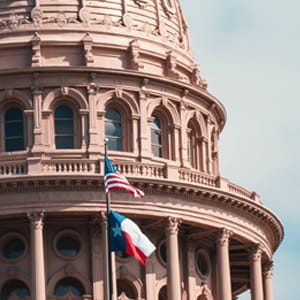Effective Sept. 1, 2024, the Texas Business Court and Fifteenth Court of Appeals opened for business.
These new courts present significant implications for businesses and individuals. Haynes Boone has developed a Texas Business Courts Task Force comprised of a group of interdisciplinary attorneys who have studied the courts since inception and are prepared to assist clients in understanding their significance and navigating their rules. Haynes Boone has one of the state’s leading business litigation practices, including a formidable trials group, paired with a deep background of experience in Texas law and procedure. The firm is well positioned to advise clients concerning these new Texas courts.
Task force members have presented, written and been quoted in the news on related issues. See below for attorney bios.
If you have questions, please contact Brad Foster, David Harper, Ben Mesches, or John Turner.
The Texas Business Courts Task Force recently hosted a firm-wide CLE to ensure all attorneys were briefed on the latest policy updates and court rules.
Watch Video:
In the News
The Texas Lawyer
Harper in The Texas Lawyer on New Law Would Bolster Texas Business Courts
The Texas Lawbook
How to Get a Case Into and Out of Texas' New Courts
Law360
Texas Could Be Next Delaware, Attys Say As Biz Court Opens
Business Insurance
Texas business courts could draw companies
Houston Chronicle
Move over, Delaware: Texas Poised to Create Specialized Business Courts
The Texas Lawbook
Business Court Building Blocks Taking Shape
Texas Lawyer
The Business Courts Are Coming—Can They Meet Expectations?
Law360
Haynes Boone Task Force Tackles New Texas Business Courts
Texas Business Court FAQs
Under HB 19, which created the court system, the Texas governor appoints the judges in the system. They must be attorneys with 10 or more years of experience in any combination of the following: (a) practicing complex civil business litigation; (b) practicing business transactional law; or (c) serving as a civil judge. Judges are appointed for two-year terms and can be reappointed multiple times. Governor Greg Abbott’s first appointments are:
- First Division (Dallas): Andrea Bouressa and William "Bill" Whitehill.
- Third Division (Austin): Melissa Andrews and Patrick Sweeten.
- Fourth Division (San Antonio): Marialyn Barnard and Stacy Sharp.
- Eighth Division (Fort Worth): Jerry Bullard and Brian Stagner.
- Eleventh Division (Houston): Sofia Adrogué and Grant Dorfman.
- Fifteenth Appellate Court: Scott A. Brister (Chief Justice), Scott K. Field (Place 1) and April L. Farris (Place 2).
The rules for the Texas Business Courts are set by the laws and rules prescribed for district courts, as specified by HB 19. These rules govern practice, procedure, rules of evidence, issuance of process and writs, and all other matters pertaining to the conduct of trials, hearings and other issues in the business court. The Texas Supreme Court approved preliminary procedural rules for the new court earlier this year, which were open for public comment until May 1, 2024. The final rules are expected to take effect on September 1, 2024.
Recent updates include Rule 354, which addresses jurisdiction and venue establishment, and Rule 355, which outlines the procedure for removing cases from general jurisdiction trial courts to the business court. Rule 356 allows general jurisdiction judges to seek transfer of cases to the business court, and Rule 357 suspends statutes of limitations for up to 60 days when claims are dismissed and refiled.

Harper in Bloomberg Law: Law Firms Join Early Winners in ‘Very Hot’ Texas Business Court
October 27, 2025
Mallick in DBA Headnotes: Generative Artificial Intelligence and the Texas Business Court
July 25, 2025











